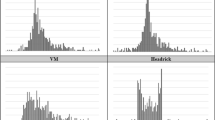Abstract
The contrast effect is a psychological phenomenon in which people exaggerate their differences. When making social comparisons, people cope with the discomforts associated with negative comparisons by criticizing others and splitting into smaller groups of similar others or by assimilation, depending on whether they perceive themselves as the member of a majority or minority group, respectively. This contrast or assimilation phenomena can explain the exaggeration of differences among computational simulation scholars. Those exaggerations are discussed in this paper as well as some realistic reasons for differences. Recognition of our status as minority group members and the virtues of assimilation and mutual support are advocated.
Similar content being viewed by others
References
Axelrod R (1984) The evolution of cooperation. Basic Books, New York
Brewer MB, Weber JG (1994) Self-evaluation effects of interpersonal versus intergroup social comparison. J Personal Soc Psychol 66(2):268–270
Carley KM (2002) Inhibiting adaptation. In: Proceedings of the 2002 command and control research and technology symposium. Conference held in Naval Postgraduate School, Monterey, CA. Evidence Based Research, Vienna, VA, 2002
Carley K, Fridsma D, Casman E, Yahja A, Altman N, Chen LC, Kaminsky B, Nave D (2004) BioWar: scalable agent-based model of bioattacks. IEEE Trans Syst Man Cybern A
Epstein J, Axtel R (1996) Growing artificial societies: social science from the bottom up. Brookings Institution Press, Washington
Festinger LA (1954) Theory of social comparison processes. Human Relat 114–140
Maritan CA, Coen CA (2004) An agent-based model of investing in capabilities: processes, decisions, and performances. Published in the best paper Proceedings, 2004 academy of management conference
McGrath JE (1981) Dilemmatics: The study of research choices and dilemmas. Am Behav Sci 25(2):154–179
Mussweiler T, Rüter K, Epstude K (2004) The ups and downs of social comparison: Mechanisms of assimilation and contrast. J Personal Soc Psychol 87:832–844
Turner JC, Hogg MA, Oakes PJ, Reicher S, Wetherell MS (1987) Rediscovering the social group: A self-categorization theory. Basil Blackwell, Oxford
Waddell P, Borning A, Noth M, Freier MN, Becke M, Ulfarsson G (2003) Microsimulation of urban development and location choices: design and implementation of urbanSim. Netw Spat Econ 3(1):43–67
Author information
Authors and Affiliations
Corresponding author
Additional information
My thanks to participants of the 2004 NAACSOS conference who reacted to the first version of this talk.
Rights and permissions
About this article
Cite this article
Coen, C. Contrast or assimilation: choosing camps in simple or realistic modeling. Comput Math Organ Theory 15, 19–25 (2009). https://doi.org/10.1007/s10588-008-9044-0
Published:
Issue Date:
DOI: https://doi.org/10.1007/s10588-008-9044-0




